how to become a luthier
Once again we return to our So You Want My Job series, in which we interview men who are employed in desirable jobs and ask them about the reality of their work and for advice on how men can live their dream.
Many men dream of being a craftsman of some sort – ditching the office for a workshop, working with their hands, carefully honing and shaping raw materials into something sturdy, useful, maybe even beautiful. That latter description certainly applies to the fruits of Tom Bills' labors. A luthier, or guitar maker, by trade, Bills spends his days not crunching numbers or poring over spreadsheets, but using his hands and tools to turn wood into handsome musical instruments. Below he shares what his job is like, along with some very nice pics of his crafting and handiwork.
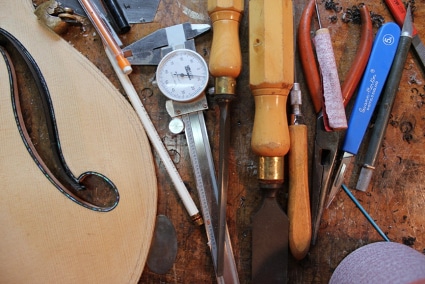
1. Tell us a little about yourself (Where are you from? How old are you? Describe your job and how long you've been at it, etc.).
My name is Tom Bills, I'm 37, and I have been professionally handcrafting guitars since 1998. I handcraft custom one of a kind guitars for players and collectors worldwide using the finest rare and beautiful woods obtainable.
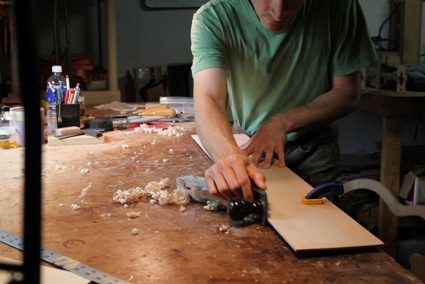
2. Why did you want to become a guitar maker? When did you know it was what you wanted to do?
In the beginning, I didn't know you could be a guitar maker as a profession. At the time, I was in college earning my degree in jazz guitar and I needed a nice archtop guitar to use in my studies. I couldn't afford one, and so I figured that I could just make one for myself. Coming from generations of woodworkers, inventors, and skilled craftsmen, it wasn't really a stretch for me to think I could make a guitar, though in retrospect I'm glad I didn't know how difficult it really was.
Many people around me tried to discourage me, and I let them stop me for a long time before one fateful autumn day. I was walking down the street in a historic part of St. Louis, my hometown, and I saw a small music shop down the way. I had guitar-making on my mind and the thought occurred to me that this little shop might have some books on making guitars. I stepped in the store and asked the shop owner if they did, in fact, have any books on guitar making. He said they did not, but he suggested I talk to the repair guy who had made one before. He hurried to the back of the store to get him for me.
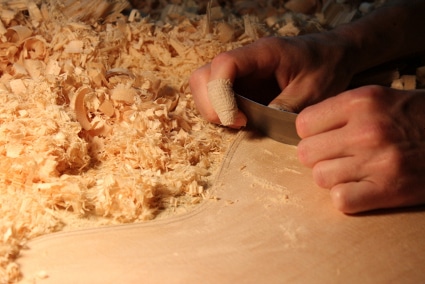
Soon, a guy named Mike King walked out and introduced himself to me and before I knew it we reached an arrangement where, similar to a weekly guitar lesson, he would let me come to his shop and use his tools for $20 one night a week. I still remember the incredible awakening that began that day as I walked out of the shop, as the reality slowly dawned like warm sunlight, that I was about to handcraft my own guitar. I couldn't help but feel a sense of destiny even then at such an early, but pivotal, moment.
Over the next few months I built my guitar, carving the top at my kitchen table, finding scraps of wood here and there, and coming up with all kinds of creative ways to do the best I could with what I had available. In the end, I did finish my first guitar, and I still remember showing up for jazz theory class with it for the first time. It definitely drew a crowd, not because the work was so wonderful, but because the other players couldn't believe that I just made myself a guitar to use. Soon after this I had my weekly guitar lesson from my instructor who was one of the best players in St. Louis at the time. Shocked that this was only my first guitar, he soon convinced me to build one for him, and I did. Before long I had a list of orders and suddenly I realized that I was a guitar maker.
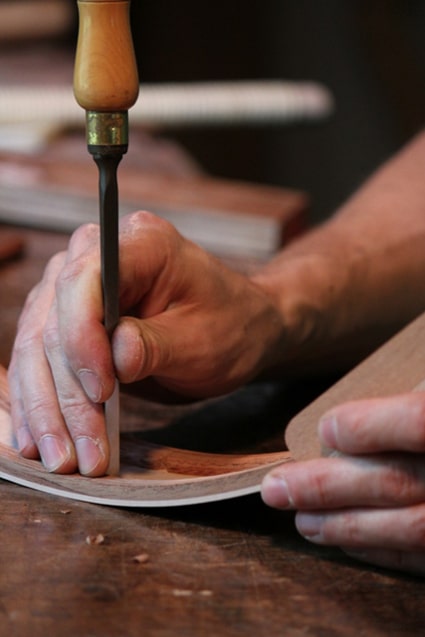
3. How do you learn this craft? Is it something you take classes in, teach yourself, apprentice in, or some combination of all three?
Traditionally a young luthier will apprentice with a master for a period of time and learn his craft, but for me I had a very different path. I was left to teach myself for the majority of my career, though I was blessed by the guidance and help of several luthiers whom I deeply respect and consider my dear friends to this day.
Aside from the help of my first teacher with whom I had my weekly "lessons," it was several years before I had another seemingly preordained encounter that opened a door for me to learn from another builder. Since then, my journeys have taken me to Baja, California, Washington state, South Carolina, and as far away as Rome, as I seemed to be following this path and always connecting with the right teacher at the right time to download just the right information I needed to go to the next level in my skills and as a person.
It has been, at times, a difficult journey, but any adventure worth taking has its share of ups and downs, hard times, and easy times, and through it all I'm constantly learning and growing, becoming better at my craft, and hopefully as a human being too.
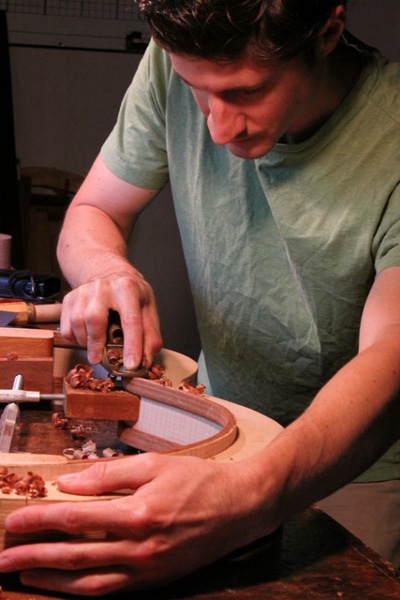
4. Besides building guitars as an independent craftsman, what other opportunities are out there for guitar makers? Can you get hired by a guitar-making company and is that something you ever did or considered?
Living in Missouri there aren't really many options as far as working in guitar factories or other such businesses, so I never really had any other options. Guitar repair is an option, but I just have an unquenchable and burning desire to create, and if I can't be building something new every day I just feel like an animal in a cage or something. Doing guitar repair doesn't have the same reward for me as I experience at the end of creating a new guitar, when I'm holding in my hands and looking upon the very object that I saw in my mind before I ever touched a piece of wood.
For a long time I focused solely on building guitars, until just recently when I began teaching young luthiers various aspects of the art of lutherie, which has been a wonderful, rewarding experience. Even though nothing will ever replace my first love of handcrafting guitars, as I have gotten a little older I do see the necessity, and even a sense of responsibility, to pass on what I have learned. Because of this and the many requests to apprentice with me, and questions I get every week; I started a website dedicated to passing on the traditional art of handcrafting guitars called theartoflutherie.com.
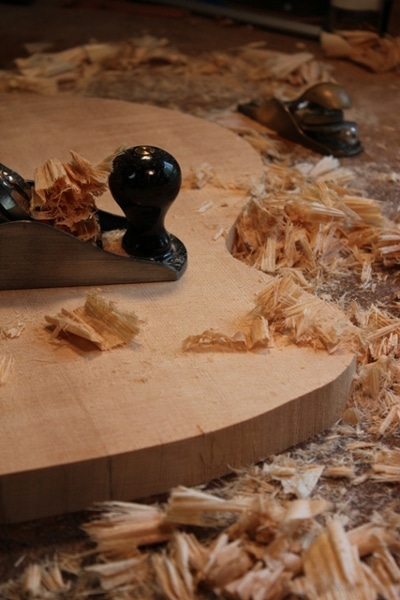
5. How does an independent guitar maker compete with the large, established companies and attract clientele?
Each guitar builder takes his own approach to marketing and business. For me I am very much an artist and my business model is similar to what I would imagine an oil painter or sculptor might be. I take only the work that inspires me most and that fuels my creativity and drive to push the envelope of what I'm capable of. Because of this, I'm not really in competition with anyone because every guitar I make is a true original, handcrafted specifically for one person, with my hands, from start to finish.
The process of having a guitar crafted by me is a journey that the customer and I embark on together as we move through the various stages of design, construction, and finally the delivery of the finished instrument. Even if someone were to copy my designs they still could not be me, and my work is an extension of who I am. People have commented many times that all of my guitars, even those of very different woods and design, have a signature sound and feel; I believe it is in part due to the countless hours I spend poring my heart and my life into each guitar. The attitude of my heart, which is motivated by a sincere desire to enrich the lives of my customers, saturates the instrument and somehow imprints it permanently in a way that even an untrained guitar player can sense. So competition is never really even a thought for me, if it were, I think it would corrupt my motives in a way and limit my potential to make a truly special and inspirational guitar.
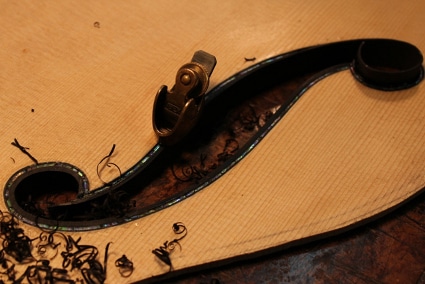
6. What is the best part of your job?
For me, the personal interaction and relationships that develop through this process are what keep me grounded and working for the right reasons. It isn't really about me, my skill, or my work, it is focused on the customer having the best experience that I can offer throughout the process and most importantly, producing a truly unique and inspiring guitar that they can treasure for a lifetime.
Since it takes me, on average, a full year from the time a guitar is ordered until it is delivered, I get to really build a relationship with them. The people I have met over the years and had the privilege to work for and with, are amazing. I can truly say there hasn't been a single one who didn't touch my life in some positive way, and my hope is that I have done the same for them as well.
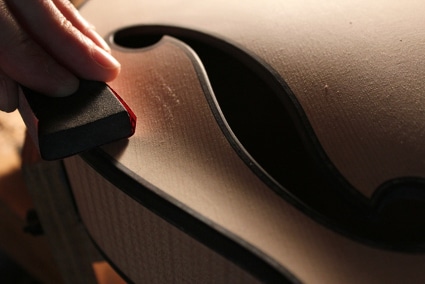
7. What is the worst part of your job?
The worst part of my job is probably dealing with the business side of things. As I mentioned above, I'm really an artist by nature and getting things perfect can be an obsession sometimes, one that doesn't work well with the bottom line. Fortunately for me, I have a very understanding wife who, each time, stands with me when I'm faced with the decision to just send the guitar and get the check, or spend an extra two weeks getting it perfect. In my experience, going the extra mile is always worth it in the long run, even though at times it seems a little crazy in the moment. Knowing that my work is my absolute best every time is priceless to me and is the only way I feel fulfilled and sleep well at night.
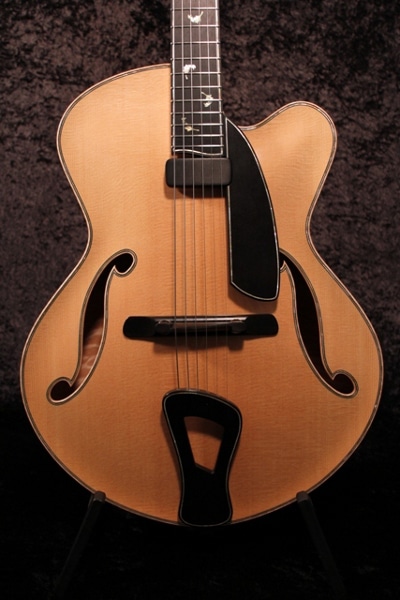
8. What is the work/family/life balance like for you?
Keeping things in balance is always a challenge — my work is constantly attempting to take things over. I am not the kind of person that has a hard time working, but rather a person who has a hard time not working. This is partly because my work is part of me; I have a sense of destiny and calling that sometimes makes it very difficult to turn my mind away from whatever guitar I'm working on at the moment.
It seems like every guitar is a new and seemingly unbeatable challenge. I never do the same thing twice, but I have an insatiable drive to keep refining and improving. This drive can be detrimental if I let it take over too much of my life. But, one thing that I do find a different yet valuable balance in is the fact that learning the art of handcrafting guitars has instilled new ways of thinking about life and the way I see and approach problems, a sense of trusting in my abilities rather than always needing some type of technology or tool to lean on. This approach that is present in the tradition of handcrafting guitars has spilled over into every area of my life.
The first phase is to master your skills. With this, one can only go so far. Mastery can be achieved with the hand tools, but that is only the beginning, not the ending. The mastery of one's self is the true challenge and only by looking deeper into that aspect can we really transcend beyond just gluing wood together into something more — something precious and from the heart. When we embark on this level of work and self-discovery, that is where things move from good to great, and where our work takes on a power that can deeply move people who see and hear it, and can impact lives for the better.

9. What is the biggest misconception people have about your job?
Many people see the high prices of my guitars and assume that I must be super rich or something, but what is so hard for many to understand is the sheer number of hours I invest into each guitar. I spend a lot of time letting my work evolve which takes time and the practice of getting quiet inside my mind in order to be able to hear clearly which direction a guitar or a piece of wood wants to take me.
To be able to express to anyone what really goes into crafting one of my guitars is quite a challenge and one that I haven't found a way to do yet.
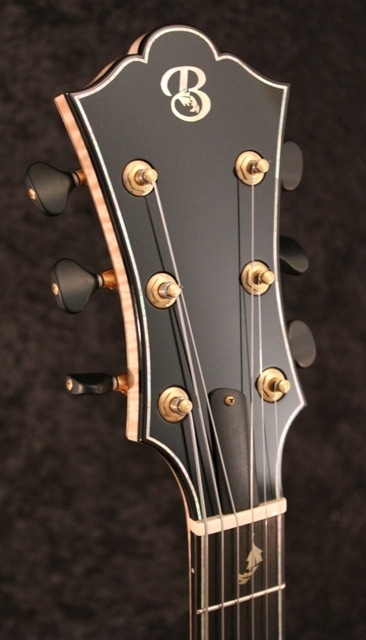
10. Any other advice, tips, commentary or anecdotes you'd like to share?
I think one of the greatest things that I could share is that whatever you do or how long you have done it, you can always learn more, so don't take yourself too seriously, and never stop learning and growing. Take what you learn and apply it to all aspects of your life, because your work will be limited or empowered not just by what you can do, but by who you are as a person.
Related Articles
Tags: So You Want My Job
Previous Next
how to become a luthier
Source: https://www.artofmanliness.com/career-wealth/career/so-you-want-my-job-luthier-guitar-maker/
Posted by: marshallzekere.blogspot.com

0 Response to "how to become a luthier"
Post a Comment